This article was medically reviewed by Erica Docimo, L.Ac., Dipl. O.M. and by wikiHow staff writer, Madeleine Criglow. Erica Docimo is a California and National Certification Commission for Acupuncture and Oriental Medicine (NCCAOM) Licensed Acupuncturist, Herbalist, and the Owner of Mind and Body Acupuncture, a holistic healthcare and lifestyle studio based in Los Angeles, California. With over 15 years of experience, she specializes in Acupuncture, Herbal Prescriptions, and Eastern and Western Nutrition. Erica holds a Masters of Chinese Medicine from The Emperor’s College with a focus on Women’s Health. She also received training at The Academy of Orthopedic Acupuncture (AOA) to become certified in pain reflex-release technique and manual nerve blocking.
There are 22 references cited in this article, which can be found at the bottom of the page.
wikiHow marks an article as reader-approved once it receives enough positive feedback. This article received 16 testimonials and 100% of readers who voted found it helpful, earning it our reader-approved status.
This article has been viewed 751,959 times.
Cough syrup may be a go-to remedy when you've got a persistent cough, but it's not for everyone. You may be looking to avoid the alcohol in the ingredients or maybe you just really hate the taste. Thankfully, there are several effective alternative remedies! Keep reading for the many approaches you can take to combat your cough for good.
Steps
Expert Q&A
-
QuestionWhat kills a cough fast?
 Erica Docimo, L.Ac., Dipl. O.M.Erica Docimo is a California and National Certification Commission for Acupuncture and Oriental Medicine (NCCAOM) Licensed Acupuncturist, Herbalist, and the Owner of Mind and Body Acupuncture, a holistic healthcare and lifestyle studio based in Los Angeles, California. With over 15 years of experience, she specializes in Acupuncture, Herbal Prescriptions, and Eastern and Western Nutrition. Erica holds a Masters of Chinese Medicine from The Emperor’s College with a focus on Women’s Health. She also received training at The Academy of Orthopedic Acupuncture (AOA) to become certified in pain reflex-release technique and manual nerve blocking.
Erica Docimo, L.Ac., Dipl. O.M.Erica Docimo is a California and National Certification Commission for Acupuncture and Oriental Medicine (NCCAOM) Licensed Acupuncturist, Herbalist, and the Owner of Mind and Body Acupuncture, a holistic healthcare and lifestyle studio based in Los Angeles, California. With over 15 years of experience, she specializes in Acupuncture, Herbal Prescriptions, and Eastern and Western Nutrition. Erica holds a Masters of Chinese Medicine from The Emperor’s College with a focus on Women’s Health. She also received training at The Academy of Orthopedic Acupuncture (AOA) to become certified in pain reflex-release technique and manual nerve blocking.
Licensed Acupuncturist & Herbalist For dry or productive coughs, taking a steamy shower will help open and hydrate your airways. Add some fresh eucalyptus to your shower to further dilate the bronchioles of the lungs and reduce coughing.
For dry or productive coughs, taking a steamy shower will help open and hydrate your airways. Add some fresh eucalyptus to your shower to further dilate the bronchioles of the lungs and reduce coughing. -
QuestionWhat can I drink to cleanse my throat?
 Erica Docimo, L.Ac., Dipl. O.M.Erica Docimo is a California and National Certification Commission for Acupuncture and Oriental Medicine (NCCAOM) Licensed Acupuncturist, Herbalist, and the Owner of Mind and Body Acupuncture, a holistic healthcare and lifestyle studio based in Los Angeles, California. With over 15 years of experience, she specializes in Acupuncture, Herbal Prescriptions, and Eastern and Western Nutrition. Erica holds a Masters of Chinese Medicine from The Emperor’s College with a focus on Women’s Health. She also received training at The Academy of Orthopedic Acupuncture (AOA) to become certified in pain reflex-release technique and manual nerve blocking.
Erica Docimo, L.Ac., Dipl. O.M.Erica Docimo is a California and National Certification Commission for Acupuncture and Oriental Medicine (NCCAOM) Licensed Acupuncturist, Herbalist, and the Owner of Mind and Body Acupuncture, a holistic healthcare and lifestyle studio based in Los Angeles, California. With over 15 years of experience, she specializes in Acupuncture, Herbal Prescriptions, and Eastern and Western Nutrition. Erica holds a Masters of Chinese Medicine from The Emperor’s College with a focus on Women’s Health. She also received training at The Academy of Orthopedic Acupuncture (AOA) to become certified in pain reflex-release technique and manual nerve blocking.
Licensed Acupuncturist & Herbalist Warm herbal teas will definitely help soothe a cough, along with any sore throat that may result from coughing. Turmeric and honey tea, peppermint tea, and ginger tea are all useful for reducing the swelling of your mucous membranes and opening the airways.
Warm herbal teas will definitely help soothe a cough, along with any sore throat that may result from coughing. Turmeric and honey tea, peppermint tea, and ginger tea are all useful for reducing the swelling of your mucous membranes and opening the airways. -
QuestionWhat should I do with rumbling in my throat that is caused by phlegm and mucus?
 Zora Degrandpre, NDDr. Zora Degrandpre is a Natural Health Doctor and Licensed Naturopathic Physician in Vancouver, Washington. She is a grant reviewer for the National Institutes of Health and the National Center for Complementary and Alternative Medicine. She received her ND from the National College of Natural Medicine in 2007.
Zora Degrandpre, NDDr. Zora Degrandpre is a Natural Health Doctor and Licensed Naturopathic Physician in Vancouver, Washington. She is a grant reviewer for the National Institutes of Health and the National Center for Complementary and Alternative Medicine. She received her ND from the National College of Natural Medicine in 2007.
Natural Health Doctor If you can feel the phlegm in your throat, it is best either to cough it up or to swallow it. The acid in your stomach will destroy any viruses or bacteria in the phlegm. To loosen the phlegm in your throat, make sure you drink plenty of water and try some herbal teas like Echinacea, chamomile, or licorice tea with some honey and/or lemon.
If you can feel the phlegm in your throat, it is best either to cough it up or to swallow it. The acid in your stomach will destroy any viruses or bacteria in the phlegm. To loosen the phlegm in your throat, make sure you drink plenty of water and try some herbal teas like Echinacea, chamomile, or licorice tea with some honey and/or lemon.
Warnings
- If you have an underlying lung condition, such as asthma or emphysema, you should let your doctor know right away if you catch a cold.[26]⧼thumbs_response⧽
References
- ↑ https://health.clevelandclinic.org/cough-syrup-cough-drops-menthol-rub-whats-best-for-my-cough/
- ↑ https://www.cochranelibrary.com/cdsr/doi/10.1002/14651858.CD007094.pub5/full
- ↑ Erica Docimo, L.Ac., Dipl. O.M.. Licensed Acupuncturist & Herbalist. Expert Interview. 5 October 2021.
- ↑ https://www.mayoclinic.org/symptoms/cough/expert-answers/honey/faq-20058031
- ↑ https://www.mayoclinic.org/symptoms/cough/expert-answers/honey/faq-20058031
- ↑ http://www.mayoclinic.org/diseases-conditions/common-cold/in-depth/health-tip/art-20048631
- ↑ http://www.mayoclinic.org/diseases-conditions/common-cold/in-depth/cold-remedies/art-20046403
- ↑ http://www.ncbi.nlm.nih.gov/pubmed/16242593
- ↑ Erica Docimo, L.Ac., Dipl. O.M.. Licensed Acupuncturist & Herbalist. Expert Interview. 5 October 2021.
- ↑ Erica Docimo, L.Ac., Dipl. O.M.. Licensed Acupuncturist & Herbalist. Expert Interview. 5 October 2021.
- ↑ https://www.health.harvard.edu/staying-healthy/what-to-do-about-sinusitis
- ↑ https://www.mayoclinic.org/diseases-conditions/common-cold/in-depth/humidifiers/art-20048021
- ↑ http://www.urmc.rochester.edu/encyclopedia/content.aspx?ContentTypeID=1&ContentID=498
- ↑ https://www.urmc.rochester.edu/encyclopedia/content.aspx?ContentTypeID=1&ContentID=498
- ↑ https://www.mayoclinic.org/diseases-conditions/common-cold/in-depth/cold-remedies/art-20046403
- ↑ https://health.clevelandclinic.org/how-much-water-do-you-need-daily/
- ↑ https://www.hopkinsmedicine.org/health/wellness-and-prevention/the-dos-and-donts-of-easing-cold-symptoms
- ↑ https://www.cochranelibrary.com/cdsr/doi/10.1002/14651858.CD000530.pub3/full
- ↑ https://www.mayoclinic.org/diseases-conditions/common-cold/in-depth/cold-remedies/art-20046403
- ↑ https://www.ncbi.nlm.nih.gov/pmc/articles/PMC2018561/
- ↑ https://www.mayoclinic.org/symptoms/cough/basics/when-to-see-doctor/sym-20050846
- ↑ https://www.mayoclinic.org/symptoms/cough/basics/causes/sym-20050846
- ↑ https://www.health.harvard.edu/staying-healthy/that-nagging-cough
- ↑ http://www.mayoclinic.org/healthy-lifestyle/adult-health/in-depth/hand-washing/art-20046253
- ↑ https://www.cdc.gov/healthywater/hygiene/etiquette/coughing_sneezing.html
- ↑ https://www.mayoclinic.org/diseases-conditions/asthma-attack/in-depth/asthma/art-20043943
About This Article
To stop coughing without cough syrup, try applying a warm towel or hot water bottle to your neck or chest, which can help relieve congestion in your lungs. You can also take a warm shower for five to ten minutes to soothe your throat and encourage mucus drainage. Alternatively, you can use a humidifier, if you have one, to improve the moisture in the air. If your cough is due to a sore throat, try gargling warm salt water to soothe your throat and moisturize your sinuses. For more tips from our Medical co-author, including how to diagnose the underlying conditions behind your cough, read on!
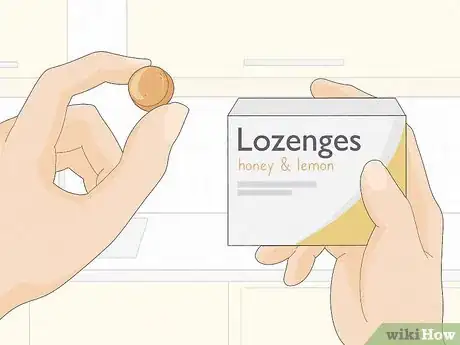
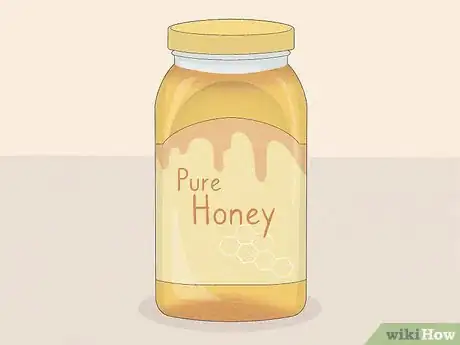



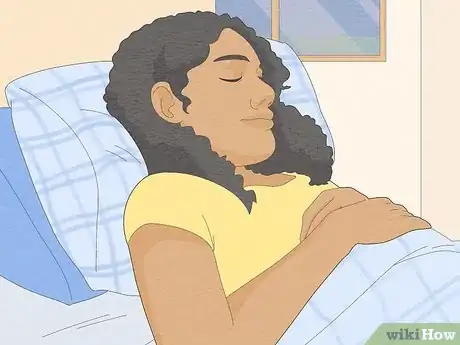
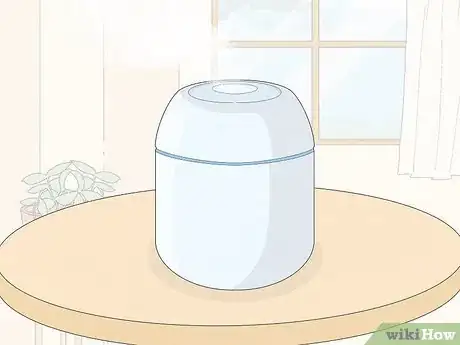
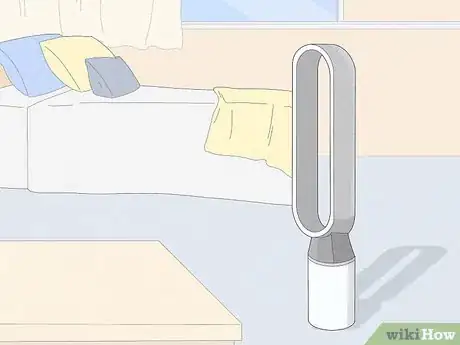
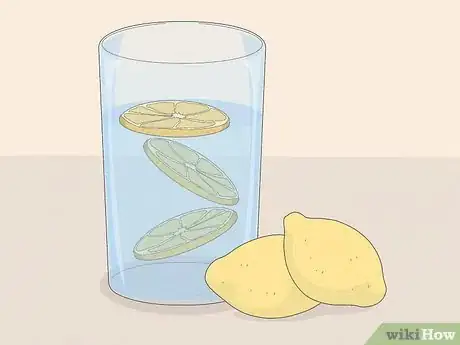

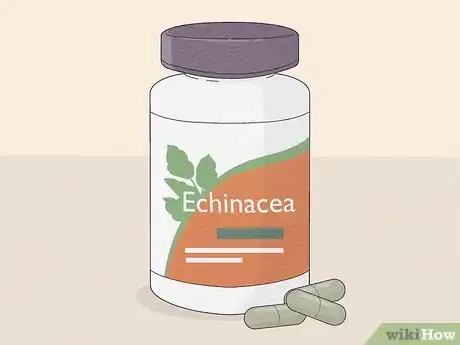
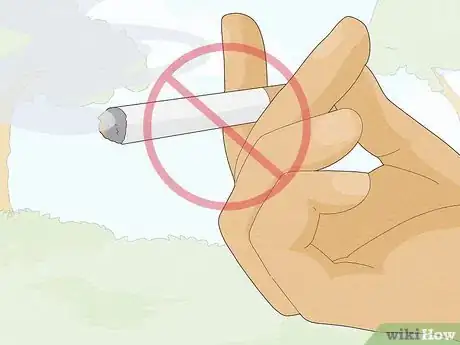
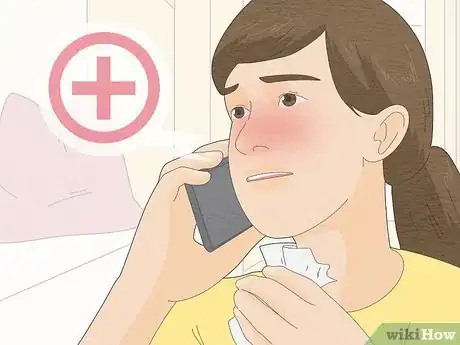


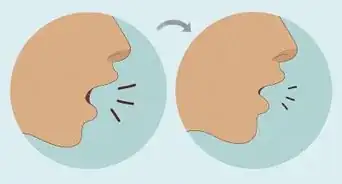



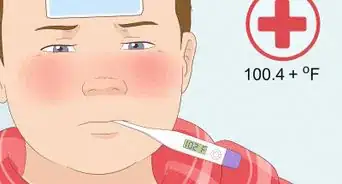
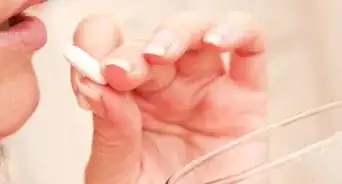
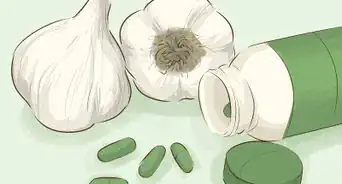



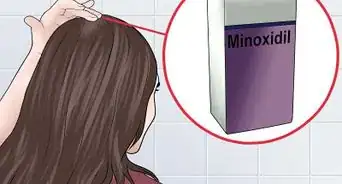

















































Medical Disclaimer
The content of this article is not intended to be a substitute for professional medical advice, examination, diagnosis, or treatment. You should always contact your doctor or other qualified healthcare professional before starting, changing, or stopping any kind of health treatment.
Read More...